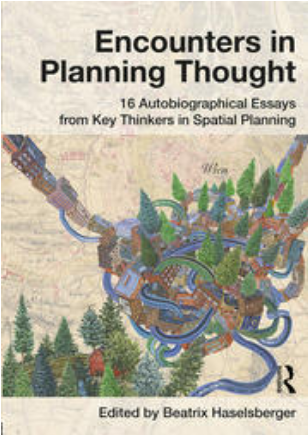Posted March 28, 2014 by cliffhague
In May in Vienna there will be a unique event. It will bring together sixteen people who have been leading figures in the academic development of planning over the past decades – or fifteen and me to be more accurate! The Evolution of Planning Thought project seeks to collect an oral history of how ideas about planning have developed, and to do it before the Grim Reaper silences those who played leading roles. It’s international planning history through the eyes of those who created it.
Fifty years ago few people thought of planning as a discipline. Many planners trained on the job; there were some university courses but they were few in number and sought to deliver practical training rather than critical research. In the decade from the late 1950s through to the end of the 1960s planning schools began to change. New staff were appointed who saw themselves as career teachers and researchers; unlike the previous generation they often came from a social science background.
The times they were a’changing
This was also a time when planning was changing. In different ways in different countries, the old certainties were being challenged, most notably perhaps the idea that plans were designs produced by experts to further the public interest. In the USA of the Civil Rights Movement, the Vietnam war and assassinations of black leaders, urban renewal was seen as a means of evicting poor and black people to literally clear the ground for higher income residents. Urban riots in 1965 forced the issue of urban policy onto the agenda.
In the UK the post-war welfare state was under new pressure on a variety of fronts (e.g. pensioner poverty, homelessness, the “failures” created by the 11+ examination) which included a growing rejection of comprehensive redevelopment. Similar patterns could be discerned elsewhere in Europe.The old ways of thinking about planning and teaching it were no longer credible.
Cast list
Some of the people who led the new thinking will be gathered in Vienna to share experiences and insights. Peter Hall will be there, probably the most prolific author amongst the assembled group. His ideas influenced the unshackling of the 1947 development control system through the enterprise zones of the 1980s.
The others from UK in the group are RTPI Gold Medallist Patsy Healey, Michael Batty whose research over four decades on mathematical modelling of cities and spatial complexity have earned him a global reputation. Then there is me.
Is Barrie Needham British or Dutch? He began teaching in the University of Nijmegan in 1978 and has brought an economics perspective onto understanding planning. Rachelle Alterman from Israel has been the leading researcher on planning law and property rights. Gerhard Schimakheads the School in the Technical University of Vienna that conceived, developed and is delivering the project. The other participants from continental Europe are Louis Albrechts,Andreas Faludi, Klaus Kunzmann and Luigi Mazza – each celebrated from their contributions to planning theory and to developing the concepts of spatial planning.
From the USA there will be John Friedmann, who has had a formidable international career which as well as teaching at UCLA includes being an advisor to governments in Brazil, Venezuela, Chile, Mozambique, and in China. John Forester has probably done more than anyone to explore the ethics and micro-politics of planning. Judy Innes, who taught at Berkeley also worked on collaborative planning and consensus building. Charles Hoch (University of Illinois, Chicago) is another planning theorist, whose work has been on plan-making and pragmatism. Then there isPeter Marcuse, a child refugee from Nazi Germany, whose life work has been around housing and social justice in planning.
A sell-out
The lectures in Vienna will be sold out – at the time of writing this there are less than 10 tickets left. However, the lectures are only part of the project. There will be “Inter-generational dialogues” in Vienna also. These will bring we oldies into formal and informal discussion with young planning scholars, not just from Vienna but, thanks to scholarships, from around the world.
The book
There will also be a book. “The Future of Planning: Personal Stories in the Evolution of Planning Thought” will be published by Routledge next year. (The eventual title was “Encounters in Planning Thought”). To guard against mere reverie from those of us in our dotage this will include contributions from young planning scholars that will probe what can be learned.

I am thrilled and privileged to be part of this special project. I look forward to our dialogues. I know they will be lively and will look forwards as well as backwards. The global geography of planning is changing fast, and I hope and believe that any future project of this ilk will be peppered by leading figures from the rapidly urbanising countries.
For now, I just look forward to one last hurrah, the chance to listen to and talk with an exceptional collection of people, young and old, from diverse places and backgrounds about what planning has meant to them, what shaped their ideas, and what planning needs to do to be relevant in a new world of climate change, burgeoning slums, big data and widening inequalities.
![]()